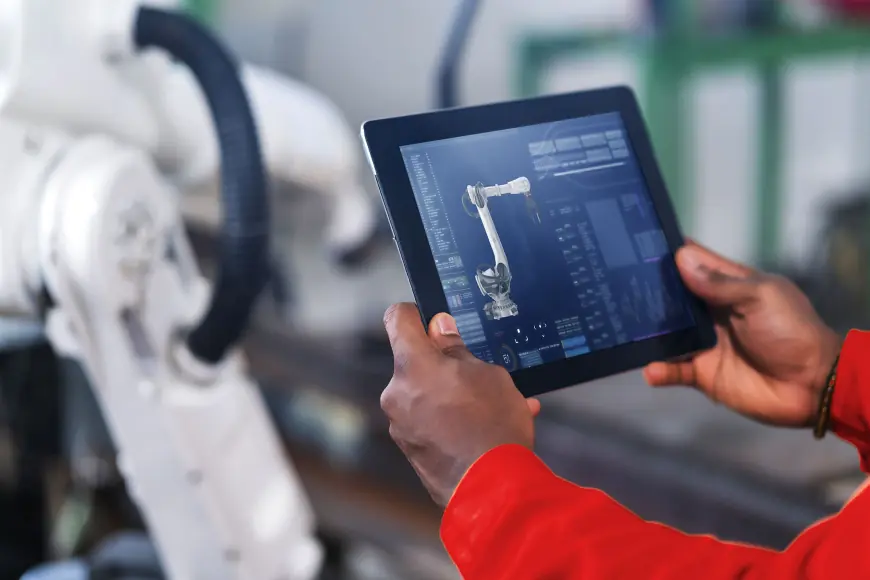Smart Factory Market Size And Forecast 2025 - 2033
The global Smart Factory market is projected to reach US$524.7 Billion by 2033 from US$240.1 Billion in 2025. The market is expected to register a CAGR of 10.5% from 2025–2033. This growth is primarily driven by the integration of advanced technologies such as artificial intelligence (AI), the Internet of Things (IoT), robotics, big data analytics, and cloud computing into manufacturing systems.

The concept of a smart factory is revolutionizing manufacturing by integrating advanced technologies like IoT, AI, robotics, and big data analytics. This transformation is driving the rapid growth of the smart factory market, enabling businesses to enhance efficiency, flexibility, and quality like never before.
Request Sample: https://m2squareconsultancy.com/request-sample/smart-factory-market
What is the Smart Factory Market?
The smart factory market encompasses the ecosystem of hardware, software, and services designed to create highly digitized and connected manufacturing environments. These factories use real-time data and automation to optimize production processes, reduce downtime, and improve decision-making.
Smart factories are central to Industry 4.0, where machines, systems, and humans collaborate seamlessly.
The Global Smart Factory Market is dominated by a few large companies, such as
- ABB
- Emerson Electric Co.
- Siemens
- Schneider Electric
- Mitsubishi Electric Corporation
- General Electric
- Rockwell Automation, Inc.
- Honeywell International Inc.
- Yokogawa Electric Corporation
- OMRON Corporation
- Endress+Hauser
- FANUC Corporation
- WIKA
- Dwyer Instruments, LLC.
- Stratasys
- 3D Systems Corporation
- Others
Core Technologies Powering Smart Factories
-
Internet of Things (IoT)
Sensors and connected devices gather real-time data across the production line, enabling better monitoring and control. -
Artificial Intelligence (AI) and Machine Learning
AI algorithms analyze data patterns to predict maintenance needs, optimize workflows, and enhance quality control. -
Robotics and Automation
Automated robots perform repetitive or hazardous tasks, increasing safety and productivity. -
Big Data and Analytics
Processing vast amounts of manufacturing data helps uncover insights for continuous improvement. -
Cloud Computing
Cloud platforms provide scalable infrastructure for data storage, processing, and collaboration.
Key Benefits and Applications
-
Increased Operational Efficiency:
Smart factories minimize waste, reduce downtime, and streamline processes. -
Enhanced Product Quality:
Real-time monitoring ensures defects are detected early and corrected. -
Flexibility and Customization:
Factories can quickly adapt to changing market demands and produce customized products. -
Predictive Maintenance:
Early detection of equipment issues prevents costly breakdowns.
Industries adopting smart factory solutions include automotive, electronics, pharmaceuticals, aerospace, and more.
Buy Now: https://m2squareconsultancy.com/purchase/77
Market Trends Driving Growth
-
Rising Adoption in Emerging Economies:
Countries like China and India are investing heavily in smart manufacturing. -
Integration of 5G Technology:
Faster, reliable connectivity is accelerating real-time data exchange. -
Focus on Sustainability:
Smart factories help reduce energy consumption and environmental impact. -
Collaborative Robots (Cobots):
Human-robot collaboration enhances productivity and safety.
Challenges in the Smart Factory Market
-
High Initial Investment:
Setting up smart infrastructure can be costly. -
Cybersecurity Risks:
Increased connectivity makes factories vulnerable to cyberattacks. -
Skilled Workforce Shortage:
There is a growing need for workers proficient in digital manufacturing technologies.
Access Full Report: https://m2squareconsultancy.com/reports/smart-factory-market
Future Outlook
The smart factory market is projected to experience substantial growth over the next decade, driven by continuous technological innovation and industry demand for agility and efficiency. Businesses that embrace smart factory technologies will be better positioned to compete in the digital economy.
Related Reports:
https://m2squareconsultancy.com/reports/smartwatch-market
https://m2squareconsultancy.com/reports/smart-lock-market
https://m2squareconsultancy.com/reports/edible-oil-market
What's Your Reaction?
 Like
0
Like
0
 Dislike
0
Dislike
0
 Love
0
Love
0
 Funny
0
Funny
0
 Angry
0
Angry
0
 Sad
0
Sad
0
 Wow
0
Wow
0

















































